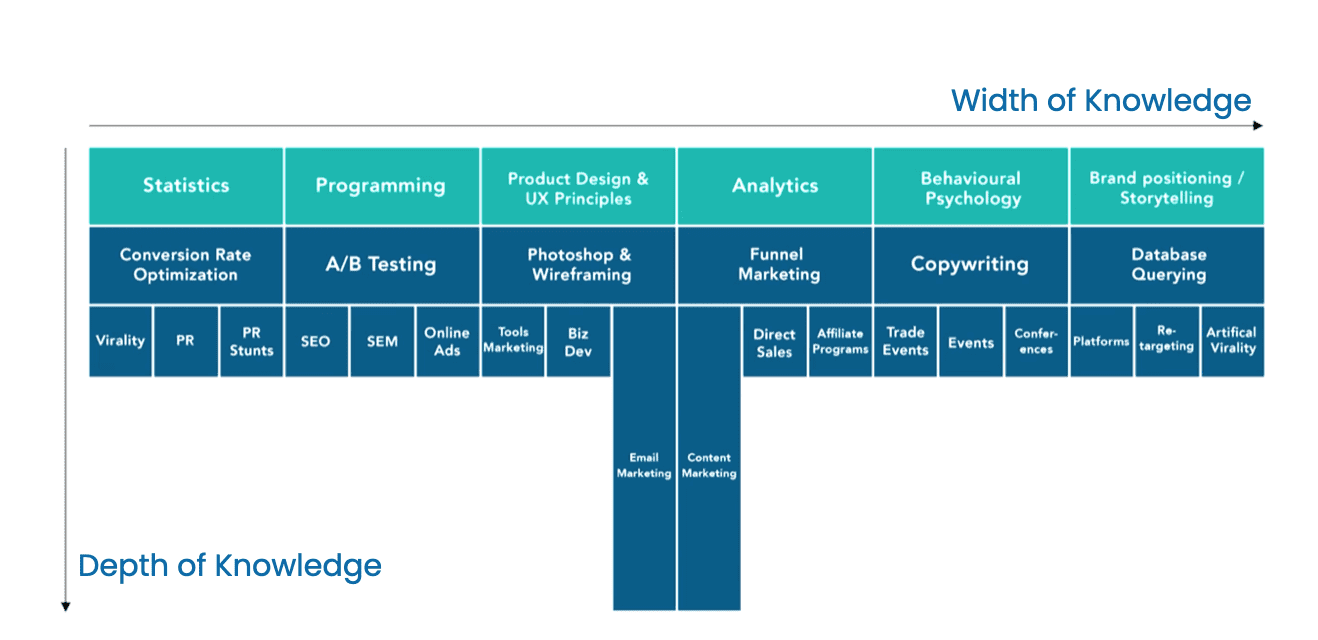Let’s talk about today’s marketing team member.
Tell me if this sounds familiar… I started a new role in a marketing team on a Monday. The job duties were pretty well defined in the interview process and reasonable for a single team member.
By Tuesday afternoon, the role changed dramatically andnow I’m responsible for all of these activities and more.
FROM THIS…
Initial Responsibilities:
Branding, Sales Enablement and Events
TO THIS…
Email Marketing, Retargeting Campaigns, Content Marketing, Thought Leadership, Sales Enablement, Affiliate Programs, SEO, SEM, Web Design, Events, Collateral Design, Direct Mail, Copywriting, Branding, Product Positioning, Product Marketing, Social Media Marketing, Digital Media Buying, Lead Generation, and Analytics
Feeling Overwhelmed?
Do I have experience in all of these different specialized areas? Yes.
Do I believe I could do all of these different activities? Yes.
Do I believe I could do anything more than the minimum for each of these areas? No.
I could just get by doing the minimum and shining in at most 1 or 2 areas. The rest would have to just be good enough. Feeling overwhelmed? I sure was!
Introducing The T-Shaped Marketer
As I tried to make my way through the to do list where all of those activities were a priority, I learned about the T-shaped marketer.
This concept of T-shaped persons describes the abilities of people at work. Often times the word “generalist” is used to apply to a T-shaped person.
The vertical bar on the letter T represents the depth of related skills and expertise in a single field. The horizontal bar is the ability to collaborate across disciplines with experts in other areas and to apply knowledge in areas of expertise other than one’s own.
The T-shaped marketer diagram creates a blueprint for how someone could grow their marketing skills created by Brian Balfour.

T-Shaped Marketer Components
According to Buffer, there are 3 components of the T-Shaped Marketer.
Base knowledge is the non-marketing-specific areas that everyone on the team should have. In theory, anyone who applies for a marketing role within your company would have competence with these abilities, and anyone on the current marketing team would focus on leveling up in these areas first and foremost. These basic abilities trickle down and inform the other skills you need. Are we saying they need psychology degrees? No, but having a basic understanding of behavior psychology, persuasion and influence definitely help when crafting campaigns.
Marketing foundation is the marketing-specific subjects that are useful across most all marketing channels. Some of these foundational skills aren’t the foundational skills at every company. Most teams don’t expect everyone on the team to have foundational skills in CRO. The marketing foundation at your company is likely to have some unique areas of value meaning this T shaped model will have a unique set of components for your business.
Channel expertise refers to audience and acquisition channels. The idea with channel expertise is that someone will have one or more channels for which they have great depth of knowledge. This would be where we feel we have the most expertise.

It’s Your Turn
This is the breadth of the marketer. Think right now of your existing marketing team. What are their strengths? Where are the weaknesses?
Remember: They can’t do everything. You want a marketer that is really good in one to three areas. If they are producing amazing work in those 1-3 areas, you will see results. As a generalist, if you want them to be great in all areas, they will produce ok work. Is OK really good enough to push your business forward?
Let’s use me for example. I have a degree in psychology and am self taught in design (for the last 20 something years). I’ve been building on my skills with analytics and testing. However, if you asked how amazing I am at databases or SEO, I’m not, but that’s where my team complements me. However, I’m confident in my ability to write product messaging, create emails that get opened and design a beautiful, highly converting website.
This T shape could easily be applied to any of your marketing team members with varying depths of expertise. Line up your team members and see how many areas are missing expertise.
Reconciling Gaps
Once the team is lined up and you have areas of expertise mapped out, you will notice some obvious gaps. These gaps may be small and easily covered by a re-prioritization of your team goals. These gaps may also show that it may be time to bring in some help.
Before we jump right into hiring a team member, is it necessary? Some gaps require a full-time internal team member. Some gaps can be filled with the right marketing partner. We know we can’t do it all and we can’t do it all well. That’s where a marketing partner comes into play. Partners have the resources and expertise you need to help you achieve more with your marketing. Let’s be clear. This is a partnership. It’s not taking away anyone’s job from someone on your team. To be successful, they are a part of your team. They work with your team and align on goals, strategies and tactics to accomplish the organizations goals.

